Natural Home Remedies for Dengue
By Dr Siddharth Gupta +2 more

Get,

to manage your symptom
Get your,


4 Cr+ families
benefitted

OTP sent to 9988776655



You’ve successfully subscribed to receive
doctor-approved tips on
Whatsapp

Get ready to feel your best.

Hi There,
Download the PharmEasy App now!!


Register to Avail the Offer
Send OTPBy continuing, you agree with our Privacy Policy and Terms and Conditions

Hi There,
Sign up on PharmEasy now!!
Trusted by 4 crore+ families

OTP sent to 9988776655



You have unlocked 25% off on medicines




Code: NU25
By Dr Siddharth Gupta +2 more
Table of Contents
Dengue is a well-known disease that is spread by a mosquito carrying the dengue virus. The dengue virus is mostly found in tropical and subtropical places worldwide, including parts of Asia and the Pacific Islands, Africa, Eastern Mediterranean, and Central and South America. Although it is not transmitted from person to person, the virus can be transmitted from pregnant mothers to their children1.
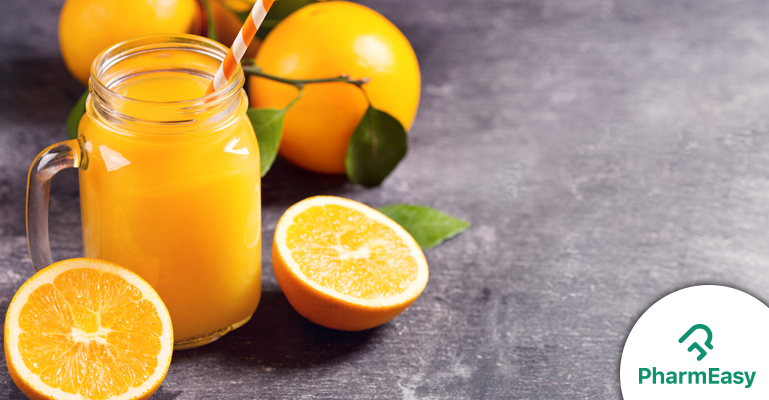
Dengue can cause high fever and other symptoms, which may sometimes even become life-threatening. Knowing the signs and symptoms of dengue can help with early detection and quicker recovery. In this blog, we will discuss some basic facts and tell-tale signs of dengue, aiming to provide you with the knowledge on when prompt action is needed from your side.
Dengue is caused by the Dengue virus. This virus enters the human blood through bite of Aedes mosquito, particularly Aedes aegypti and Aedes albopictus species. The mosquito carries the virus in its saliva. The virus starts to multiply after entering your blood. Finally, the virus along with the immune system’s response makes you feel sick1.
In most cases, one might not experience any symptoms of dengue fever. However, high fever is the most common symptom of dengue. Other possible symptoms of dengue include:
One might start experiencing the symptoms only four to ten days after the mosquito bite, which may last for three to seven days.
If you notice these symptoms, reach out to your healthcare provider immediately. Timely intervention can help you recover quickly.
While medical treatment remains the cornerstone of management of dengue, some simple home remedies may help with easing your symptoms when used adjunctly. These include:
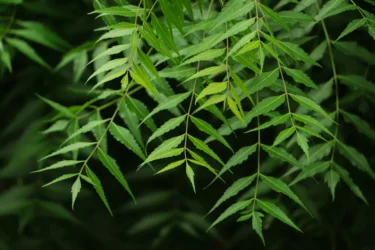
Some lab studies have shown that neem leaf extract could stop the growth of the dengue virus in animals. Therefore, neem leaves may be used to help deal with the infection3.
Boil some fresh neem leaves in water. Drinking this water may help you recover quickly. You can also drink the juice of neem leaf. To make neem juice, grind some fresh leaves with a cup of water. Strain this liquid in a cup and your juice is ready. You can add some honey or lemon juice to taste.
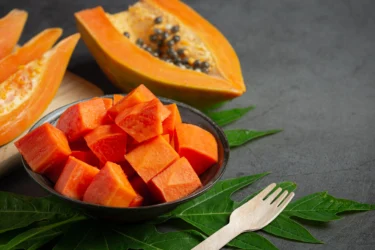
Papaya leaves have been used in traditional medicine for the treatment of dengue fever. The role of papaya leaves in managing dengue has been investigated. The results are promising, revealing that papaya leaf could help increase the platelet count, white blood cells and neutrophils in some individuals. Increased platelet count could help prevent bleeding, thereby preventing the progression of the disease3,4.
You can consume papaya leaf juice to help with the fever and restore normal platelet count. The juice is prepared by grinding fresh papaya leaves with a cup of water. Strain the liquid in a cup and papaya juice is ready to use.
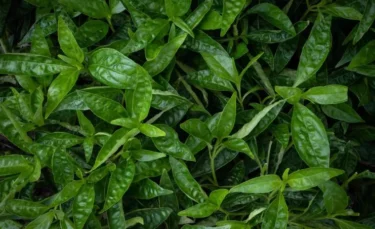
Kalmegh, also known as Andrographis peniculata, is a medicinal herb effective in a range of disease conditions. For example, in lab trials, an extract of kalmegh showed antiviral activity against the dengue virus. Therefore, kalmegh may be used to help relieve dengue symptoms5.
You can drink kalmegh leaves or flowers, grind it and add it to a glass of water to make kalmedh juice.
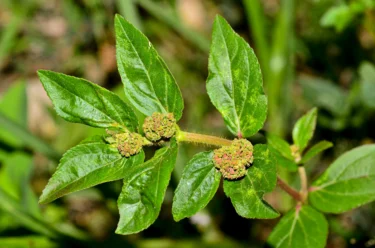
Asthma weed, known as Dudhi in Hindi, is an essential medicinal herb with many beneficial properties. It may help ease dengue fever and improve platelet count in people suffering from Dengue6.
To use dudhi, you need to boil the paste of Dudhi leaf in water. Reduce the water to 1/4th of its volume and consume as needed.
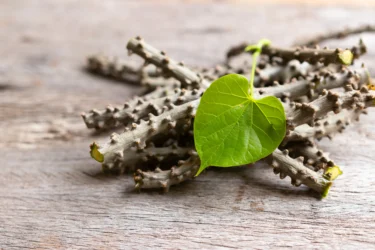
Guduchi or giloy is a common herb used as a remedy for many health conditions. Guduchi is proposed to boost the immune response and fight off viral infections in humans7.
You can drink Guduchi juice daily to help with the symptoms of dengue. Guduchi juice is made by blending freshly chopped Guduchi with a glass of water into a smooth consistency. Strain the blended mixture to remove any solids and your Guduchi juice is ready.
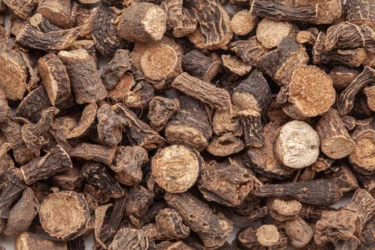
Golden eye grass or Kalimusli is a medicinal herb effective in many conditions. The roots and rhizomes of kalimusli are used in many disease conditions. Its use may boost the immune response.
Although, research is limited for its use, you can try taking kalimusli powder with milk to help fight off infection.
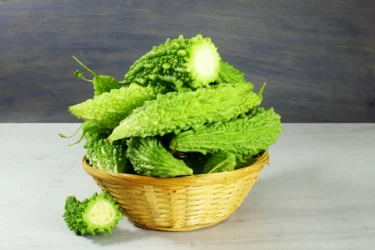
Momordica charantia, known as karela in Hindi and bitter gourd in English, possesses many health benefits. Karela extract has shown inhibitory action against the multiplication of dengue virus in lab studies3.
You can use karela as a vegetable and use it in foods and dishes. You can also make karela juice to help with dengue. To make karela juice, peel the skin, chop it into pieces, add a glass of water, and blend this mixture. Once it’s blended, strain the liquid. You can add more water to balance the taste, and your karela juice is ready.
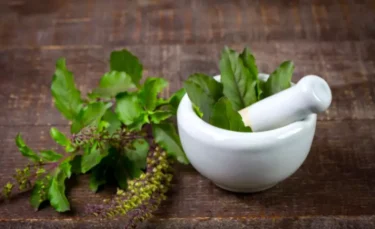
Basil, known as Tulsi in Hindi, is an aromatic herb native to tropical regions of Asia. Tulsi leaves have been used to manage dengue fever traditionally. Tulsi has antimicrobial properties and its protective action against the dengue virus has been observed in lab studies3.
For making tulsi tea, boil a few fresh tulsi leaves in water. Let it simmer for a while and strain it in a cup. You can add a few drops of lemon juice or a teaspoon of honey for taste.
Though some studies show the benefits of herbs and home remedies in Dengue, evidence is limited. Therefore, there is a need for large-scale human studies to establish the true extent of the benefits of these home remedies on human health. Thus, these should only be taken cautiously and never as a substitute for medical treatment.
One of the most important aspects of managing Dengue fever is hydration- the patient must take lots of oral fluids to maintain BP, as the most common complication of dengue is low BP.
Dr. M.G. Kartheeka, MBBS, MD (Pediatrics)
Also Read: Dengue: The Silent Threat of the Monsoon Season
You need to contact your healthcare specialist if you experience any symptoms of dengue.
However, if you notice any signs of dengue worsening, you must contact your nearest hospital or healthcare provider immediately2. These include the following:
It would be best if you did not rely on home remedies alone for dengue treatment. Consult a qualified doctor for advice as soon as you notice any symptoms, and continue the home remedies along with prescribed treatment or as suggested by your doctor.
Also Read: 10 Best Types of Tea to Relieve Cough and Cold
Dengue is an infectious disease spread through mosquito bites. If not treated in time, dengue can progress to a severe form of infection which can be fatal. There are some herbs like kalmegh, tulsi, neem, papaya leaves, dudhi and guduchi that you can use to relieve your symptoms at home. However, these herbs should not be used as an alternative to medical treatment provided by the doctor. If you or someone around you is suffering from dengue, reach out to your healthcare provider immediately. Taking timely treatment and precautions can help prevent the infection from getting worse.
Also Read: Natural Home Remedies for Chest Congestion
There are herbs that you can use to relieve symptoms of dengue. Herbs like neem, tulsi, kalmegh, karela, guduchi, dudhi, papaya and kalimusli can improve symptoms experienced in dengue. However, before using these herbs to relieve dengue, make sure you have consulted your healthcare provider. Dengue can get worse if not treated in time. Do not use any herbs or remedies without consulting your doctor.
You can use papaya and dudhi leaves to increase the platelet count in dengue. These leaves have shown improvement in the overall platelet count in the blood. However, you are advised not use them as alternate to medical treatment. Any herbal remedy for dengue should not be taken without consulting your healthcare provider first.
Timely treatment of dengue prevents it from progressing to a life-threatening stage. If you are experiencing symptoms of severe dengue infection such as blood in vomit and stool, stomach pain, extreme fatigue and nosebleed, head to the nearest hospital or clinic immediately.
1. Center for Disease Control: How Dengue Spreads [Internet]. [cited 2025 Jul 9] Available from: https://www.cdc.gov/dengue/transmission/index.html#:~:text=Through%20mosquito%20bites,to%20other%20people%20through%20bites.
2. New York City State: Department of Health [Internet]. [cited 2025 Jul 9] Available from: https://www.health.ny.gov/diseases/communicable/dengue_fever/
3. Abd Kadir SL, Yaakob H, Mohamed Zulkifli R. Potential anti-dengue medicinal plants: a review. Journal of Natural Medicines. Oct 2013;67(4):677. Available from: https://www.ncbi.nlm.nih.gov/pmc/articles/PMC3765846/
4. Sarala N, Paknikar S. Papaya extract to treat dengue: a novel therapeutic option?. Ann Med Health Sci Res. 2014;4(3):320-324. Available from: https://pmc.ncbi.nlm.nih.gov/articles/PMC4071726/
5. Ramalingam S, Karupannan S, Padmanaban P, et al. Anti-dengue activity of Andrographis paniculata extracts and quantification of dengue viral inhibition by SYBR green reverse transcription polymerase chain reaction. Ayu. 2018;39(2):87-91. Available from: https://pmc.ncbi.nlm.nih.gov/articles/PMC6369606/
6. Perera SD, Jayawardena UA, Jayasinghe CD. Potential Use of Euphorbia hirta for Dengue: A Systematic Review of Scientific Evidence. J Trop Med. 2018:2048530. Available from: https://pmc.ncbi.nlm.nih.gov/articles/PMC5926475/
7. Singh N, Yadav SS. Anti-dengue therapeutic potential of Tinospora cordifolia and its bioactives. Journal of Ethnopharmacology. 2024 Apr 26:118242. Available from: https://www.sciencedirect.com/science/article/abs/pii/S0378874124005415
8. Joshi RK, Agarwal S, Patil P, et al. Anti-Dengue Activity of Lipophilic Fraction of Ocimum basilicum L. Stem. Molecules. 2023;28(3):1446. Available from: https://pmc.ncbi.nlm.nih.gov/articles/PMC9921342/
Disclaimer: The information provided here is for educational/awareness purposes only and is not intended to be a substitute for medical treatment by a healthcare professional and should not be relied upon to diagnose or treat any medical condition. The reader should consult a registered medical practitioner to determine the appropriateness of the information and before consuming any medication. PharmEasy does not provide any guarantee or warranty (express or implied) regarding the accuracy, adequacy, completeness, legality, reliability or usefulness of the information; and disclaims any liability arising thereof.
Comments

Leave your comment...
You may also like
Comments